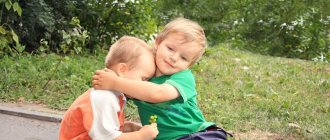What do we mean when we talk about moral education?
Moral education is the inculcation in children of high spiritual and moral principles, a sense of patriotism for the Motherland, and special regulation of ways of thinking and behavior accepted in civil society.
The first experience of working on the structure of behavior and the formation of moral principles begins in kindergarten, when adults give the first lessons to preschoolers. From an early age, a kindergarten teacher instills in children love for the Motherland, frugality and respect for human labor, goodwill in relationships, teaches activity and initiative, independence in action, mutual assistance and mutual assistance, selflessness.
The research work of scientists studying the psychology and capabilities of preschool children shows that preschool children have great potential in matters of educating their morality. Children's consciousness is able to control their behavioral abilities, such as active behavior, independence in their actions and choices, and the manifestation of a certain interest in the environment.
Older preschoolers are capable of collectivization, where feelings of friendship and camaraderie are already manifested in their joint actions. The more a child sees correct actions and deeds, and the more often he hears positive things, the higher his moral education is - this is the main task of educators.
The child must develop positive habits and motives for moral behavior.
Everything that a child sees and hears that has a negative character and negative actions is also deposited in the child’s consciousness and harms his morality.
Children like to communicate with adults; with frequent communication, they develop a feeling of love and affection; children happily carry out assignments, try to please and do something pleasant for adults.
Preschoolers tend to show emotional responsiveness to adults’ reactions to children’s good and bad actions. When children are scolded, they worry and get upset; when they praise them, they smile and rejoice. Such responsiveness is the basis for the formation of a child’s moral feelings.
Preschoolers, due to their age, experience joyful or sad feelings not only for themselves, but also for their peers. They are able to be happy and sad for their comrades out of a sense of solidarity, which leads to effective actions to provide moral support. Preschoolers do not know how to be cunning or disingenuous; their feelings are sincere and not false.
In kindergarten, you can see a picture when one of the children is injured or bumped, and peers gather around him and sadly feel sorry for him.
Moral feelings acquire their consciousness closer to middle age, they are able to appreciate the work of other people, and are able to show feelings of love for their home and region.
By the age of six, children begin to develop a sense of self-esteem, a sense of duty, they recognize the justice of actions, and develop feelings of respect towards other people. Children of this age begin to approach tasks and assignments with full responsibility.
The task of kindergarten teachers is not to miss the time when children show the ability to develop moral feelings, to instill in children a love for their native land and the country in which the children were born and live, and also to teach them to respect people of other nationalities and their culture.
One of the characteristics of children is imitation, but children do not recognize or understand the morality of the actions they perform, and this can be fixed in the mind by negative life experiences.
In this regard, the task arises for parents and educators to protect preschoolers from objects and situations of imitation that carry immorality of feelings and behavior and from such life experiences.
It is very important to teach a child simple things, such as: goodwill - respect for adults, maintaining good relationships with peers, thrift, politeness, friendliness, cultural behavior.
With the initial skills acquired, the child is closer to the older preschool age, will learn to comprehend his actions and behavior, moral behavior will become the norm of life of the preschooler and will become his companion in further development.
Basic methods of moral education of preschool children
Moral education of preschool children is a complex process of forming the child’s beliefs and value system, implemented through certain methods, which include:
- Persuasion and Conversation;
- Inspiration to action;
- Appeal to sympathy and empathy;
- Encouragement;
- Punishment.
At preschool age, the child does not yet understand what is good and what is bad, but he is maximally open to the emotional perception of the situation. Therefore, in the early period of moral education of preschoolers, standard methods are ineffective.
Many parents, in the process of educating morality in a child, assign the main role to the mechanisms of reward and punishment, incorrectly interpreting these methods, reducing them to material reward and physical punishment or material deprivation. As practice shows, this tactic is also ineffective in the long term, since physical and material deprivation is a manifestation of external moral control for preschool children. Moral education is designed to stimulate the manifestation of internal encouragement (oneself) and internal deprivation (punishment - unauthorized refusal of encouragement, benefit).
The importance of moral principles in the mind of a child
In order for moral principles to be more firmly established in the child’s mind, a kindergarten teacher must teach preschoolers using specific examples, and in order for the child to show interest in the learning process, make wider use of the capabilities of the playing field, use games, scenes, fairy tales, cartoons, etc.
The most widespread work in this direction was in kindergartens of the Soviet Union. In modern Russia, this work was left to chance for decades, and now people have again come to the realization that it is time to resume educational processes and it is time to start teaching people morality again.
Moral issues should be included in kindergarten programs throughout the entire educational process. Moral education should be reflected and find a place even in creative activities: thematic drawings, songs, modeling, and so on.
First of all, appropriate contact must be established between the teacher, child and parents, their goals and objectives must be the same.
The team is the most effective means of education and therefore it is not worth keeping children reclusive at home before school in the care of a grandmother or nurse - kindergarten is the most suitable area for conducting educational activities.
In a team, a child is able to demonstrate his knowledge, share it with friends, and learn positive experiences from peers.
In kindergarten, children understand that collectively and together they can achieve a common goal and accomplish more tasks than alone. For example, one child cannot make a snowman, but with a close-knit and friendly group it will only take about an hour, or even less.
The lively children in the group become more humble, the shy ones become more sociable. In his activities, the teacher must be demanding, but not rude, and be able to make compromises in disputes - this is also part of moral education and an example to follow.
Discipline in kindergarten should not suppress initiative and positive emotions. The teacher can afford this if he himself is restrained and patient with the children. The child should feel and see only positive emotions on the teacher’s face.
Moral education of preschool children in kindergarten is aimed at developing moral qualities in various forms of activity. At the same time, teachers pay great attention to the personal development of children.
In kindergarten, various thematic events are often held, during which children learn the moral and ethical aspects of behavior in a peer group and with adults.
Moral conversations with children, both in kindergarten and in a family setting, help children understand why they need to behave in one way or another.
A good means of moral education for preschoolers is a fairy tale. The actions of fairy-tale characters will tell preschoolers what can await them in the event of immoral behavior.
Main aspects of moral education of preschool age
The relevance of the problem of moral education is due to the crisis of modern society, in which there has been an erosion of moral norms, the importance of the institution of family, and spiritual values, which significantly complicates the path of personal development of a preschool child. Moral education is designed to contribute to the formation of a harmonious personality, aware of the norms and values that determine the foundations of relations between people in society.
The crisis of morality in society is facilitated by modern frivolous methods of raising children, in which the child receives the basics of moral education outside the family through means imposed by a demoralized society (for example, computer games that develop selfishness and cruelty).
Why should moral education begin at a very early age? During this period, the child is maximally open to emotional experience and empathy. The child takes the words and actions of adults for granted, without questioning them, which happens at an older age when the child learns to analyze words and actions, compare experiences and draw certain, not always correct, conclusions. The experience acquired by young children will later move into the category of what is proper, true, canonical, and beyond doubt.
Moral education in preschool age is implemented through a system of methods and means, but the main source of moral education and the formation of a harmonious personality of a child is his family. An auxiliary mechanism for the implementation of moral education of preschool children are kindergartens, whose role is to correct errors in raising a child in the family.
Stages of child moral development
Parents, educators and peers play a critical role in the development of spiritual and moral qualities, which at their core are a set of rules and expectations that determine behavior. At different stages of their development, children have different values, different points of view, and many connections that influence their moral development.
- Stage of punishment and submission. In the early stages of moral development, children are driven by the desire to avoid punishment and satisfy their needs through obedience to rules and simple choices between right and wrong.
- Stage of justice and equality. At this stage of development, children become selfish; they strive to satisfy their needs before others. Very rarely do children meet the needs of others.
- Stage of expectations and rules. With experience and help from adults, children progress to the next stage of moral development, where individual morality is shaped by interpersonal norms and the expectations of others (such as peers, teachers, and parents).
- Law and order stage. At this stage of development, behavior is characterized by obedience to the law, respect for persons in authority, and adherence to social rules and norms.
- Social contract stage. Outside of traditional ideas, appropriate behavior is based on social norms, rules and laws. However, care must be taken to ensure that individual values are not violated and that fairness is maintained.
- Stage of universal and ethical principles. Although behavior is often governed by rules, laws, and expectations, there are exceptional circumstances where independent judgment and moral reasoning may trump conventional norms in the decision-making process.
Formation of moral qualities: it all depends on age
For children of different ages, emphasis should be placed on different points. The following is very important:
- For the little ones - to make them feel the love of others and teach children to express it; gently and carefully condemn aggression.
- For younger preschoolers – teach to strive for success and adequately perceive failures; The coincidence of the presented theory and the example of adults is very important.
- For middle preschool children - teach how to solve logical verbal problems, guided by the concepts of morality; the ability to understand and perceive the feelings of others.
- For older preschoolers, teach how to analyze positive and negative actions.
Theory is good, correct and important. But literary beautiful phrases or, conversely, unpleasant examples from life often repel children and make them stressed. We must teach how to apply theory in practice. So that it doesn’t turn out like this: the child knows how to act, but it doesn’t find application in life. And he acts by inertia, as he is used to.
We need to let him try to act correctly and tell him what this is exactly: help, kindness, support, politeness, etc. After all, it often turns out that an adult says that he loves someone or something (mother, friends, animals), but does not show it in action. And if you love your mother, fold your clothes neatly, make your bed and put away your toys. Help grandma find medicine and slippers. Change the water in your dog's bowl or add some food.
Moving from theory to practice
It is best to impart knowledge through games and combined activities. Topics can be very different: friendship, family, charity, respect for nature, respect for older people, patriotism, good and bad, what selflessness and kindness are, politeness, sympathy, initiative, charity, etc.
There is no need to try to embrace the immensity; it is better to take small steps and build one lesson around only one topic. You need to come up with a concept, select practical tasks, cartoons, games, rhymes, didactic
Thank you for your attention!





